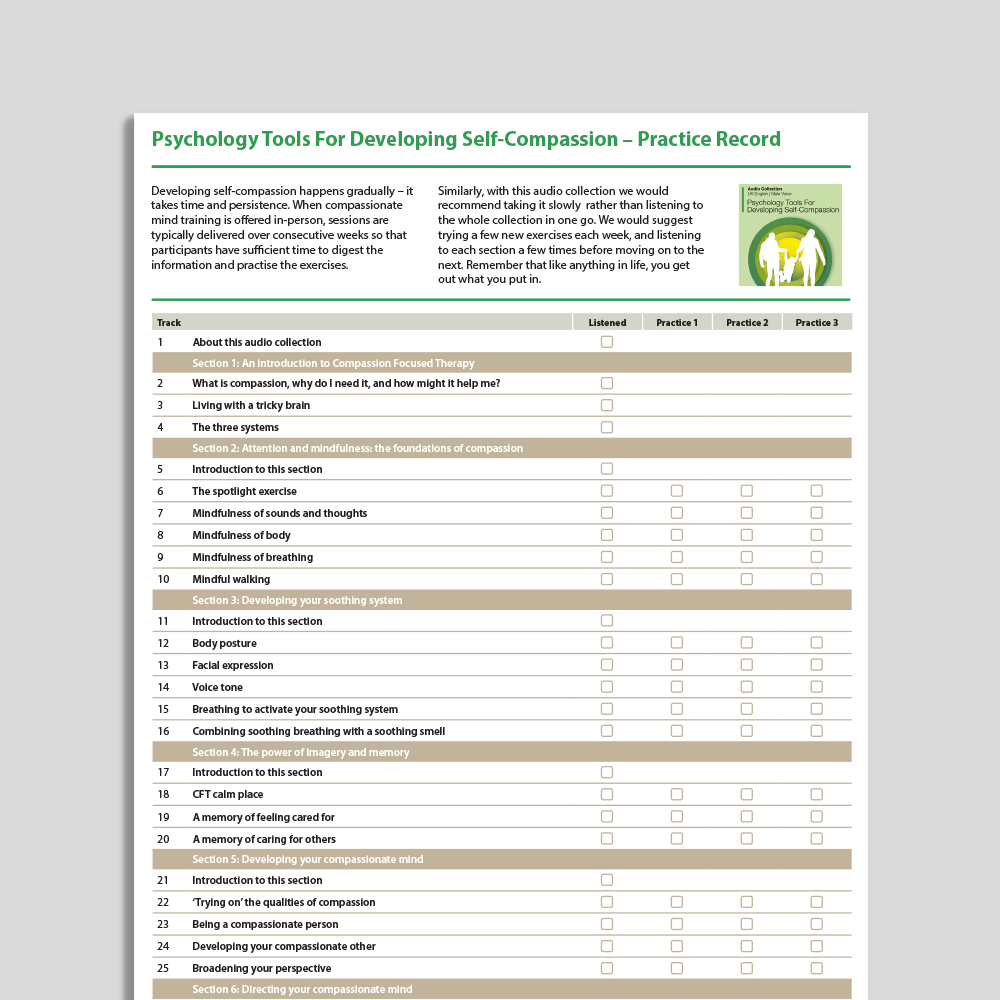25th April 2023 Newsletter


Psychology Tools
Published
This week, to accompany our Developing Self-Compassion Audio Collection that was released earlier this month, we have some helpful tips from Dr Chris Irons for getting the most out of the collection, and a companion resource to help clients keep track of their practice. We’ve also added some Spanish translations for working with eating disorders and body dysmorphia.
In our research roundup, we highlight a paper looking at the treatment of traumatic bereavement, and another paper exploring the use of a team formulation within an acute inpatient setting.
New Releases

How to work most effectively with our Developing Self-Compassion Audio Collection
Psychology Tools for Developing Self-Compassion was developed with Dr Chris Irons, a leading Compassion Focused Therapy (CFT) expert, researcher, author and international CFT trainer, who has been working with this approach for over 20 years. In this article, Chris explains how therapists and counselors can work most effectively with the collection, and help their clients get the greatest benefit from it.

Developing Self-Compassion – Listening and Practice Record
The developing self-compassion audio collection is best approached in a bite-sized way and with each track being listened to a few times. This companion record helps you and your clients to keep track of how many times they have listened to each section, and to record their progress through the course.

New Translations: Spanish Guides
We’ve built the world’s biggest library of multilingual therapy resources. In our ongoing mission to make our resources accessible to a wider audience, we’ve added three new Spanish translations. You can now download Understanding Anorexia, Understanding Bulimia, and Understanding Body Dysmorphic Disorder in Spanish.
Latest Research

Treating PTSD Following Traumatic Bereavement
An excellent practical paper by Jennifer Wild, Michael Duffy & Anke Ehlers describes the core components of CT-PTSD for bereavement trauma, and clarifies the therapy’s differences from treating PTSD associated with trauma where there is no loss of a significant other. A core focus of CT-PTSD when applied to bereavement trauma is to reduce the sense that the deceased is still suffering or not at peace and create a sense of continuity in the present with what has been lost in the past. It addresses how to work with important cognitive themes such as meanings of loss, guilt, and a perception that one’s loved one is still suffering or cannot find peace.
Wild, J., Duffy, M., & Ehlers, A. (2023). Moving forward with the loss of a loved one: treating PTSD following traumatic bereavement with cognitive therapy. The Cognitive Behaviour Therapist, 16, e12.

CBT Interpersonal Team Formulation
In mental health services, the practice of team formulation has gained popularity, especially in situations where a team-based approach is needed to support care pathways like those found in inpatient, intellectual disability, and older adult services. Katherine Berry & Rosalyn Hartwell present an interpersonal cognitive behavioral model of team formulation which aims to provide a historical and developmental context for understanding the person’s difficulties as well as the possible role of the staff team in maintaining difficulties.
For those interested in team formulation, the Association of Clinical Psychologists UK also have a thoughtful overview of considerations for mental health services here.
Berry, K., & Hartwell, R. (2023). Using CBT interpersonal team formulation on mental health inpatient wards. Journal of Clinical Psychology, 1– 11.
Get sent more useful pieces like this!
Sign up to our monthly newsletter full of helpful ideas, tools, and tips for mental health professionals like you. You'll find out about our latest resources, and you can also read our reviews of the latest research.
It's completely free and you can unsubscribe at any time.